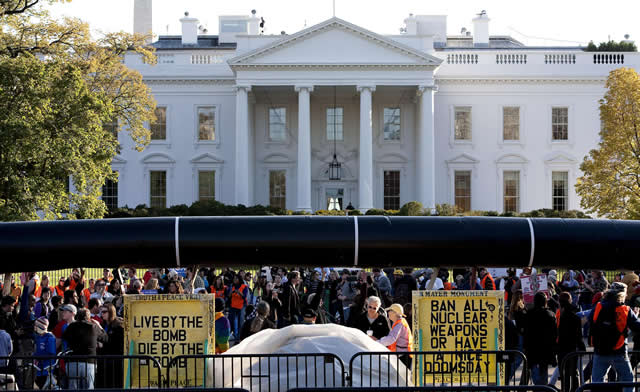
Demonstrators carry a giant mock pipeline while calling for the cancellation of the Keystone XL pipeline during a rally in front of the White House in Washington November 6, 2011.
President Obama’s politically intoned decision to reject TransCanada’s permit application to construct a 1,700-mile pipeline from Alberta, Canada, to Texas refineries sent a clear message that special interest demands are of more importance than more energy and much-needed job creation.
Building the pipeline would bring over 700,000 barrels of oil per day and directly create 20,000 truly shovel-ready jobs. The Canadian Energy Research Institute estimates that current pipeline operations and the addition of the Keystone XL pipeline would create 179,000 American jobs by 2035.
Since TransCanada and Nebraska politicians have agreed to reroute the pipeline, the focus should now be on completing the reroute design and beginning construction. Congress should recognize the findings in the State Department’s “Final Environmental Impact Statement” and authorize the application submitted by TransCanada in September 2008.
Given the need for jobs and more oil on the global market to offset high prices, the permit application had been moving along positively with bipartisan support without much attention until environmental activists made blocking the Keystone XL pipeline their issue to rally around for 2011. Although President Obama and the Department of State (DOS) said they’d make a decision at the end of 2011, they ultimately catered to a narrow set of special interests, punting the decision until after the 2012 elections.
The payroll tax holiday legislation signed at the end of 2011 moved that decision date up to February 21. Today, however, the President rejected the permit, claiming, “This announcement is not a judgment on the merits of the pipeline, but the arbitrary nature of a deadline that prevented the State Department from gathering the information necessary to approve the project and protect the American people.” President Obama initially delayed the decision because he claimed that additional environmental review from the DOS was necessary.
This is a stunning (though not unexpected) decision. At a time when unemployment remains unacceptably high, Iran is threatening the Strait of Hormuz, and Canada is looking to take this oil elsewhere, it is difficult to understand how the President could say no to thousands of jobs and an increase in energy supply from our ally.
Environmentalists and opponents of the pipeline are blaming Republicans for forcing the President to make a decision that he was not ready to make (purportedly because additional environmental review was necessary), but this accusation is laughable. DOS has already conducted a thorough, three-year environmental review with multiple comment periods.
DOS studied and addressed risk to soil, wetlands, water resources, vegetation, fish, wildlife, and endangered species. They concluded that the construction of the pipeline would pose minimal environmental risk. Keystone XL also met 57 specific pipeline safety standard requirements created by DOS and the Pipeline and Hazardous Materials Safety Administration (PHMSA). The pipeline would be equipped with 16,000 sensors connected to satellite that would monitor the pressure of the pipeline.
Much of the concern of environmentalists and Nebraska residents has focused on the original route of the pipeline, particularly the area where the pipeline would cross the Ogallala Aquifer—despite the fact that thousands of miles of pipeline already cross the aquifer today and DOS’s impact statement rated the potential for water contamination as minimal. Oil contamination of drinking water would not be likely in many instances because the soil composition prevents or mitigates the downward migration of oil. Simply put, this pipeline is environmentally sound, and even DOS has said so. Making excuses that we need additional environmental review is catering to special interests.
But it’s a narrow group of special interests that the President is accommodating. Plenty of Obama supporters actually support the construction of the pipeline. The most glaringly obvious is the labor unions that stand to benefit from the job creation.
Nor is this a strictly partisan project. Democratic policymakers have also voiced their support. On October 19, 2011, 22 House Democrats sent a letter to President Obama pleading that “America needs the Keystone XL Pipeline. It is in our national interest to have a Presidential Permit issued for Keystone XL as soon as possible.” The letter mentioned that “the Department of State’s Final Environmental Impact Statement reaffirmed the findings of the two previous environmental impact statements, namely, that the Keystone XL Pipeline will have no significant impact on the environment.”
Understanding the economic implications, Senators Max Baucus (D–MT), Jon Tester (D–MT), Joe Manchin (D–WV), Ben Nelson (D–NE), Mark Begich (D–AK), and Mary Landrieu (D–LA) have all expressed support for the pipeline.
Energy Secretary Steven Chu did not explicitly support the pipeline but did acknowledge that “it’s not perfect, but it’s a trade off” and that Canadian oil sands producers are “making great strides in improving the environmental impact of the extraction of this oil.” These are bold words from a man who has unabashedly derided fossil fuels in support of renewable energy and welcomed high gas prices. President Obama’s former “car czar” Steve Rattner also emphasized that the President should approve the pipeline permit.
Moreover, just a day before the decision, the President’s own jobs council underscored the need for not only more oil, natural gas, and coal but also energy infrastructure projects. The report says:
Continuing to deliver inexpensive and reliable energy is going to require the United States to optimize all of its natural resources and construct pathways (pipelines, transmission and distribution) to deliver electricity and fuel. The Council recognizes the important safety and environmental concerns surrounding these types of projects, but now more than ever, the jobs and economic and energy security benefits of these energy projects require us to tackle the issues head-on and to expeditiously, though cautiously, move forward on projects that can support hundreds of thousands of jobs.
It’s ironic that the President’s first action following the release of this report is an abrupt dismissal of one of its key recommendations.
To meet those alleged environmental concerns in Nebraska, a reroute could be managed successfully by TransCanada and Nebraska state officials to alleviate any concerns, and construction of the pipeline could commence immediately if the President approved the permit. That’s why Congress should authorize the pipeline application as submitted by TransCanada pursuant to its authority to regulate commerce with other nations. Since there is no federal entity that sites and authorizes interstate petroleum pipeline construction, the state of Nebraska could site and approve an alternative route, following the PHMSA’s construction codes.
While the decision would again ultimately end up on President Obama’s desk, it would send a strong message that this country needs the jobs, the energy, and the economic growth.


























